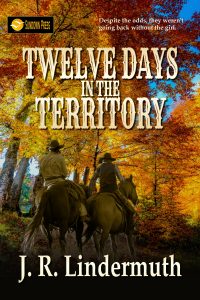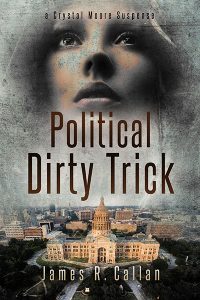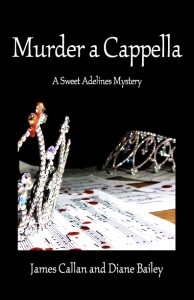On May 1, the second Father Frank Mystery, Over My Dead Body, is scheduled to release. So, today, I’m going to preview chapter 1. Let me know what you think.
Chapter 1
Syd snorted and thrust his chin toward his adversary. “Over my dead body.”
The man almost smiled. “If you insist,” he said easily.
Seventy-two year old Syd Cranzler squinted against the bright Texas October sun and scrutinized the well-dressed man in front of him. Syd was probably six inches shorter than the man, but Syd’s voice had more iron in it. “Was that a threat?”
“No sir, Mr. Cranzler,” Duke Heinz said.
Syd didn’t like this city slicker, wouldn’t have even if he weren’t trying to steal Syd’s homestead. Even Duke’s clothes irritated him. The conservative black pinstriped suit, power-red tie and black wing-tips polished to perfection made the man look like he was posing for a magazine picture in New York City. And what was this “Duke” bit? Did he think he was John Wayne? “Why don’t you just mosey on down the road a mile?” He jerked his hand up and pointed. “Lots of land there.”
They stood on pine needles under three towering trees. Forty feet behind them was Syd’s small, frame house, looking like a giant, square tumbleweed.
Bud Wilcox, Pine Tree’s City Manager pushed his straw hat back a little and took a step forward. “Syd, Pine Tree wants this shopping center here, inside the city limits. Think of all the tax revenue we’ll get.”
“So’s you can waste even more’n you do now? It ain’t your house and land, Pipsqueak”
Bud reddened at the nickname Syd often used on him, but kept his mouth shut.
A mud-caked ‘92 Camaro rattled to a stop half off the black-top road. A man got out and started across the yard to where Syd was shaking his finger at Bud.
Duke started to speak, but Syd cut him off. “And don’t tell me again it’s twice what it’s worth. You don’t know what it’s worth to me. And what’s this ‘fee simple’ bit?” He cocked his head to the side. “You think I’m simple? Take your money and go back to Jersey.”
Bud waggled his balding head. “It’s a lot of dollars.”
“He don’t need your money,” said the man from the Camaro. “He stole enough from me.”
“Stay out of it, W.C.,” Syd snapped. But his focus never left Duke. “You keep your money; I’ll keep my land.”
Duke spread his hands. “Mr. Cranzler, the Supreme Court says eminent domain can be used to obtain land needed for a project in the public interest.”
“I know all ‘bout the Supreme Court, and how they trampled all over people’s property rights. I’d like to see some private company try to take the land they live on. They’d change their tune right fast. But that case was decided for a Yankee town. This is Texas. We still believe in property rights down here. And this ain’t in the public interest. It’s in Lockey Corporation’s interest.”
Duke smiled as he pulled a folded paper from the inside pocket of his coat. “Here’s the court order, and it’s signed by a judge right here in Texas.” He held the paper out to Syd.
Syd ignored it. “Judge McFatage, right? He’d sign anything for a price.”
Bud Wilcox leaned in. “Now, Syd, you shouldn’t talk about the Honorable McFatage that way.”
“Honorable, my foot. He’s for sale. Common knowledge. You know what they say: he’s the best judge money can buy. And it looks like Lockey’s the buyer.”
“Look, Mr. Cranzler,” Duke said. “We’re going to start dirt work in three weeks. I’d like to have all the paperwork in order by then. You’ve lost this fight. You might as well recognize that. You can delay signing. But by fighting this, you may end up getting less money and paying a lot of it to lawyers. You can’t stop it. This project will be built. And it starts in three weeks.”
“Three weeks?” Syd pulled on his chin and a sly grin crept onto his leathery face. “I’m bettin’ my lawyer’ll have my appeal filed before then. And I’m thinkin’ I can tie this up for years. You sure Lockey wants to wait that long?” His head bobbed up and down as he continued. “Be a lot faster to go somewheres else.” Now he laughed. “Bet they’re gonna cut you loose when this don’t happen. Can your butt.”
Duke’s smile faded and his eyes turned hard. “Two months from now, this will all be asphalt.”
“Like I said, over my dead body.”
Duke put the paper back in his pocket. “Old man, you’ll hardly make a bump in the pavement.”
End of Chapter 1
Jim: Let me know if you think this works as an opening. Thanks.

 use built by a man who rode with Buffalo Bill Cody. A retired newspaper editor, he is now librarian of his county historical society where he assists patrons with genealogy and research. He has published 19 novels and two non-fiction regional histories. He is a member of International Thriller Writers and a past vice president of the Short Mystery Fiction Society.
use built by a man who rode with Buffalo Bill Cody. A retired newspaper editor, he is now librarian of his county historical society where he assists patrons with genealogy and research. He has published 19 novels and two non-fiction regional histories. He is a member of International Thriller Writers and a past vice president of the Short Mystery Fiction Society.
 And things go downhill from there.
And things go downhill from there.





